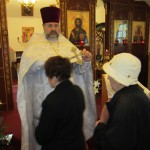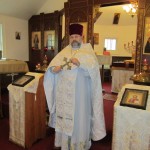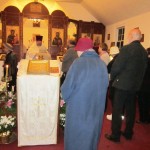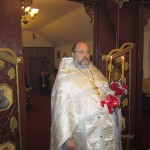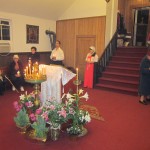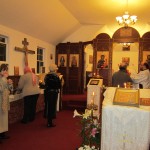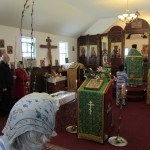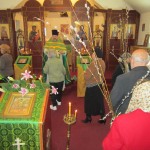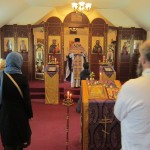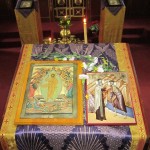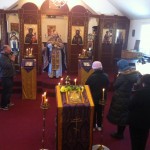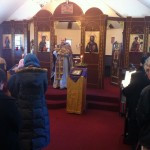On April 22, on Sunday of St. Thomas, or Antipascha the Rector of St. George’s Church, priest Igor Tarasov served the Divine Liturgy.
At his sermon following the Gospel lesson he continued his lectures on Liturgy. Fr. Igor described the actions of the deacon (or of the priest if there is no deacon serving) during the Seraphic Hymn. The star is being taken off the discos and the priest touches the four edges of the discos with the star. The practical reason for that is to open the gifts (the bread) on the discos for further consecration. And the symbolism of that rite of touching or hitting the discos four times is to show how the Angels are praising God standing at the four sides around Him. This is also a symbol of the four Gospels which tell the world about God and about His Good News. In addition, as we read in the book of Revelation, the four animals are standing around the Lamb praising Him. That vision of St. John meant that the four Gospels are preaching the truth about Jesus Christ. Finally, the ritual of hitting the discos has its origin in the ritual of the Jerusalem Temple where the people who brought up the gifts and burning the incense, hit with the small shovel on the plate during the sacrifice.
Fr. Igor also discussed the content of the Anaphora of St. Basil the Great and St. John Chrysostom. He pointed out that both of them describe the mission of our Lord Jesus Christ in redeeming the human race and leaving us the Mystery of His Body and Blood.
After the Liturgy the Rector preached shortly about the celebrated feast. He stressed the importance of faith which is lacked by many people in today’s world. St. Thomas also had doubts and required proof of Christ Resurrection. But when he recognized the risen Lord he believed. Nowadays people do not even wish to believe or believe in one thing but refuse to believe in other truths of faith. “We need to keep the firm faith in order to be called the blessed ones who have not seen, but yet believe”.
In conclusion of the service Fr. Igor distributed the particles of the Artos blessed on Pascha.
Category Archives: News
HOLY PASCHA
On April 15 all the Orthodox Christians celebrated Holy Pascha, feast of the glorious Resurrection of our Lord Jesus Christ.
Celebration at St. George’s Church took place at the early morning. Before that our Rector, priest Igor Tarasov served the Midnight service and transferred the Shroud from the middle of the temple to the altar. At midnight we started Paschal procession around the church. At the end of the procession all the faithful stopped in front of the closed doors of the temple. Fr. Igor began Matins service and sung joyful Paschal troparion: “Christ is risen from the dead trampling death by death, and to those in the tombs bestowing life”. The congregation responded by singing the same hymn. The doors to the temple were opened by the priest, and the procession entered into the church.
Fr. Igor celebrated Resurrectional Matins and Divine Liturgy. At the dismissal he greeted all our parishioners with the greatest holy day of Pascha.
Following the services the Easter food was blessed.
After finishing all the liturgical celebration Rector and parishioners enjoyed very delicious meals at Easter breakfast.
CHRIST IS RISEN! ХРИСТОС ВOСКРЕСЕ!
Memory Eternal!
We express our sincere condolences to our parishioner and parish Treasurer, Vera Koretz for the loss of her brother Nicholas.
Memory eternal! Вечная память!
Renovations in Our Temple
There were some renovations done in our temple. Our parishioners Andrew and Vitaliy Malyshew made a nice Easter gift to our parish. They sacrificed their time and effort and painted the walls and ceiling of the sanctuary before the approaching holy days.
We express our gratitude to Andrew and Vitaliy and wish them many healthy and good years! Спаси Господи! Многая лета!
Palm Sunday
On April 8 we celebrated Palm Sunday which is the feast of the Entrance of the Lord into Jerusalem. Priest Igor Tarasov celebrated solemn Divine Liturgy at St. George’s Church. Before the Liturgy Fr. Igor blessed the pussy-willows and distributed them to the parishioners. Faithful present at the Liturgy were holding the blessed branches resembling the people of Jerusalem who greeted our Lord Jesus Christ entering the holy City.
Following the Liturgy dismissal Fr. Igor preached a homily regarding the holy day celebrated. He said that Lent is coming to the end; we finished the very time of the holy Forty-day fast period and start the Holy Week. It was not easy to keep fasting, especially because many people around us did not observe the same rules, and the whole atmosphere in the society was not telling us about Lent. “In the old days of the Russian Empire Lent was noticeable: a lenten bell was constantly rang to remind the people of that season, theaters were closed and public entertainment stopped. Even if not everyone was observing fast, everybody knew about it, and the whole society was aware of that season. Now we are on our own, especially in this country where the Church and state are separated. But that separation should not mean that faith should be separated from the society, from the people. But sometimes it is understood in such a way. And we also feel some separation within ourselves, a separation between our religious life and our worldly life. We feel some duality in our lives. On one hand we are Orthodox Christians. On the other hand, we must live in this world, and the world does not always notice who we are. A similar duality was seen in the conduct of the people of Jerusalem when Jesus entered that holy City. As today’s Gospel lesson tells us, the people of Jerusalem met Jesus with the palm and olive branches, greeted Him as their King and Messiah, shouted ‘Hosanna! Blessed is He Who comes in the name of the Lord!’ But in several days these same people condemned Him to death and shouted ‘Crucify Him!’ We have to admit that such a duality is seen in the man as a result of fall. We do good and bad things. Therefore, we should strive to avoid a duality in our lives, to avoid division in our hearts and to be good followers of Christ, subjects of His Kingdom and pledge a true allegiance to Him. If we take those branches today, let us hold them and follow our Lord in His triumph, as well as follow Him in His Passions in order to enter into His Kingdom.”
Celebration of the Patronal Feast in Flushing, NY
On April 7 we celebrate great holy day of the Annunciation of the Most Holy Mother of God. Russian Orthodox Church in Flushing observes its patronal feast. Our Rector, priest Igor Tarasov and our Warden, Olga Roussanow joined our neighbors in their parish celebration. Fr. Igor served the Divine Liturgy which was headed by the Holy Annunciation’s Rector, Mitred Archpriest Alexi Ohotin. A luncheon was followed the Liturgy in the church hall.
5th Sunday of Lent
On April 1, on the 5th Sunday of Lent priest Igor Tarasov served the Divine Liturgy at St. George’s Church. On this Sunday we commemorate Venerable Mary of Egypt. Fr. Igor mentioned today’s Saint at the beginning of his homily. He then went on lecturing on the Liturgy. He explained the meaning of the Seraphic Hymn sung at the Anaphora. That hymn contains glorification of the Holy Trinity taken from the revelation to the prophet Isaiah (“Holy, Holy, Holy Lord of Sabaoth”) and a greeting of Jesus Christ made by the people of Jerusalem at the time of our Lord’s triumphal entry into the city (“Blessed is He Who comes in the name of the Lord. Hosanna…”). Due to the importance of such a moment of the Liturgy faithful present in the temple should be very attentive. All unnecessary movements and actions should stop. On the weekdays people should kneel down when this hymn is sung.
Following the dismissal of the Liturgy our Rector had a short sermon about St. Mary of Egypt. “This is an example of one of the greatest sinner who became one of the greatest Saints. This example teaches us that there is no sin that cannot be forgiven if a sinner is truly repenting. We are all sinners, even though many of us may say that we are lesser sinners than Venerable Mary was before she converted. Our sins may not be truly evaluated by ourselves. Therefore, we need true repentance, we need to use the gift of the Mystery of Penance given us by the Lord. And we have no need to go to the desert as St. Mary did. Of course, in today’s world which is very difficult, we may say, ‘I want to go to the wilderness’. But we are called to live in the world to make it a better place.” – said Fr. Igor. He also recalled an example from the life of another great desert Saint, Venerable Anthony the Great. St. Anthony was given a revelation that he can find a person who is holier than him. The Saint was led to the big city of Alexandria where he found a simple man (not a cleric or monk) who prayed and considered himself worse than other people. “Thus, living in the world but being truly humble and pious we may obtain salvation and holiness,” – said Fr. Igor.
4th Sunday of Lent
On March 25th, on the 4th Sunday of Lent our parishioners gathered for the Divine Liturgy of St. Basil the Great. The Liturgy was served by priest Igor Tarasov.
During his sermon the Rector lectured on Divine Liturgy. Fr. Igor shared some interesting facts about the place of the Nicene Creed in the liturgical celebrations in different ritual traditions. Roman Catholics, Armenians and Syro-Malabara Christians (in India) say the Creed right after the reading of the Gospel. In their rites it belongs to the Liturgy of the Word (our Liturgy of the Catechumens). In our Byzantine ritual which became the Orthodox tradition we include the Creed into the Liturgy of the Faithful. We say it right before the Eucharistic canon, or Anaphora. Fr. Igor also mentioned the symbolic meaning of the removal of the large veil from the gifts and of the waving or shaking the veil above them during the Creed. It symbolizes the stone being removed from the Tomb of Christ and nearness of the Descent of the Holy Spirit. Waving the veil also recalls the earthquake felt in the time of the Resurrection of Christ.
After the Creed the clergy serving the Liturgy (the deacon and the priest) have a dialogue with the faithful called the Eucharistic Dialogue. It includes an appeal to the faithful to stand aright for the offering of the holy oblation and a blessing with a wish the congregation to be blessed by the Holy Trinity.
Following the dismissal of the Liturgy Fr. Igor recalled the honored Saint of today’s Sunday, Venerable John Climacus. This holy Father wrote an ascetic book called “The Ladder of Divine Ascent”. It describes a number of steps of the spiritual work and warfare against sins and vices in order to achieve spiritual perfection and ascend to the heavenly glory. Fr. Igor reminded parishioners that we are called for perfection and should read that important book. “it was said that the book of St. John should be read almost the whole life. It is not like a novel that we can read in one week or one month and then totally understand it. The content of the St. John’s book is to be experienced by our own spiritual work against our sins and passions in order to get closer to out Creator,” – said Fr. Igor.
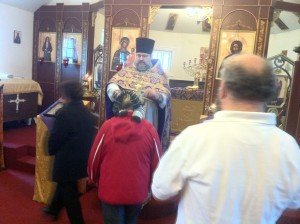
Sunday of the Veneration of the Cross
On March 18, on the 3rd Sunday of Lent when we venerate the Holy Cross, priest Igor Tarasov served the Divine Liturgy at St. George’s Church.
Since there was no Matins served in the temple, the decorated Cross was solemnly transferred from the altar and placed in the middle of the church right before the 3rd Hour.
During the sermon Fr. Igor compared today’s Sunday with a stop under a shadow of a tree made by a person on a journey. In the same way on our way of the Lenten pilgrimage we have this Sunday of the Cross as a comfort and refuge in our journey toward holy Pascha. Fr. Igor then continued his lectures on Divine Liturgy. He explained the rite of the kiss of peace, its origins and its practice in our Eastern Orthodox Church, as well as among Western Christians. He further told about the meaning of the exclamation “The doors, the doors, in wisdom let us attend”. The real sense of those words which sound a little strange in our times goes back to the history of the ancient Church when the doors to the place of worship had to be secured. In addition, the catechumens and unbaptized persons were not allowed in the temple during the celebration of the Eucharist. Therefore the deacon signaled the doormen to watch the church doors. Fr. Igor finished his talk discussing the Nicene Creed sung at each Divine Liturgy.
At the end of service Fr. Igor said a short instruction on the significance of the Holy Cross in Christian Church and culture. He expressed a great concern, a disturbance common to all the Orthodox regarding a recent decision of the British government to allow the employers to prohibit their employees to wear a cross on the neck. “This is a clear attack on Christianity because other religious groups such as Muslems and Sikh are allowed to wear their headdresses even if they serve on the British police force. It is surprising for Britain which has a combination of the plain Cross and St. Andrew’s Cross on its national flag,” – said Fr. Igor. The Rector called all the parishioners to adhere to the Holy Cross of Christ, to venerate it and not to be ashamed of wearing the crosses and also of making the sign of the cross everywhere when it is appropriate to do, for instance, when we pass an Orthodox church. He said: “Let us remember what our Lord said about those who will be ashamed of Him: ‘For whoever is ashamed of Me…of him the Son of Man also will be ashamed when He comes in the glory of His Father with the holy angels.(Mk. 8, 38)’. Thus, let us not be ashamed of our Lord and Savior.”
Service was ended with the veneration of the Cross.
Following the services the parishioners enjoyed coffee and some lenten refreshments.
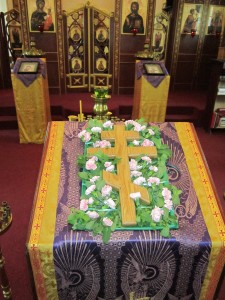
2nd Sunday of Lent
On the 2nd Sunday of Lent priest Igor Tarasov served the Divine Liturgy at St. George’s Church. On this day we commemorate St. Gregory Palamas, a great theologian and teacher of the Church. Our particular, Russian Church also celebrates gathering feast of all Venerable Fathers of the Kiev Caves.
Fr. Igor had a homily followed after the reading from the Gospel. He said that on the 2nd Sunday of our Lenten journey we are given an instructive story from the holy Gospel about our Lord Jesus Christ healing a paralytic. But before the healing our Lord forgave the sins of that man. That teaches us about the power granted by God to His Son, and through Him to His Church, to absolve people from their sins. Therefore, we should use the Mystery of Penance, especially during Lent. Penance helps us in our spiritual efforts during such a special time. And the examples of St. Gregory Palamas and of the holy Fathers of the Kiev Caves are also very helpful at this point of our Lenten pilgrimage toward the holy Resurrection. St. Gregory Palamas taught about uncreated light of God, the divine energy that may be obtained through intense prayer and spiritual life, and Venerable Fathers of the Caves did practice spiritual and prayerful life and became the partakers of that light.
Fr. Igor then continued his sermon with a lecture on Liturgy. He described the ceremony of the Great Entrance pointing out that the whole Liturgy is an act of universal remembrance. That is why at the Great Entrance we have a commemoration of the Church hierarchy, clergy, civil authorities, founders and benefactors of the temple, and all Orthodox Christians. We ask God to remember them in His Kingdom. Fr. Igor further described the symbolism of the ceremonies at the end of the Great Entrance. When the priest places the Gifts upon the altar, takes off small covers from the vessels and cover them with the veil he recalls taking down of the body of Jesus from the Cross and laying Him in the tomb. This is why the priest, doing so, recites the troparia describing those holy actions.
At the end of the Liturgy Fr. Igor reminded faithful of the celebrations of the Presanctified Liturgy on Fridays. He invited parishioners to attend those services. Such services may comfort the people in their Lenten endeavor. Thanks to them faithful may receive the Eucharist and participate in divine worship not only on Sundays, but on some other days of the week.

